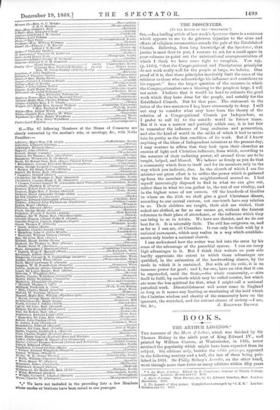THE DISSENTERS.
(TO THE EDITOR OF THE "SPECTATOR.']
SIH,—In a leading article of last week's Spectator there is a sentence which appears to me to do grievous injustice to the aims and efforts of religious communities outside the pale of the Established Church. Believing, from long knowledge of the Spectator, that justice is most dear to you, I venture to ask for a small space in your columns to point out the unintentional misrepresentation of which I think we have some right to complain. You say, (p. 1460), "that the Congregational and Presbyterian principles do not work really well for the people at large, we believe. One proof of it is, that these principles inevitably limit the cares of the minister to those who acknowledge his influence and contribute to his support." Into the larger question of the measure in which the Congregationalists are a blessing to the people at large, I will not enter. I believe that it would be hard to estimate the good work which they have done for the people, and notably for the Established Church. But let that pass. The statement in the latter of the two sentences I beg leave strenuously to deny. I will not stay to consider what may have been the theory of the relation of a Congregational Church (or Independent, as
I prefer to call it) to the outside world in former times. But if it was a narrow and partially selfish one, it is but fair to remember the influence of long exclusion and persecution, and also the kind of world in the midst of which it had to main- tain its purity as the first condition of its work. But if I know anything of the ideas of Independent ministers at the present day,
I may venture to affirm that they look upon their churches as centres of light and Christian influence, from which, according to the measure of their radiating power, all around them are to be taught, helped, and blessed. We believe as firmly as you do that a community which lives to itself and for its members only in the way which you indicate, dies. In the church of which I am the minister our great effort is to utilize the power which is gathered up from the members for the neighbourhood around us. I feel myself increasingly disposed to find in what we can give out, rather than in what we can gather in, the test of our vitality, and in the highest sense of our success. Of the hundreds of families to whom on the 25th we shall give a good Christmas dinner, according to our annual custom, not one-tenth have any relation to us. Their children are taught, their sick are visited, their naked are clothed, as far as our means go, without the faintest reference to their place of attendance, or the influence which they can bring to us in return. We have our district, and we do our best for it. It is miserably little. The evil has outgrown us, and as far as I can see, all Churches. It can only be dealt with by a national movement, which may realize in a way which establish- ments only hinder a national church.
I can understand how the writer was led into the error by his sense of the advantage of the parochial system. I can see many high advantages in it. But I think that writers on your side hardly appreciate the extent to which those advantages are qualified, in the estimation of the hardworking classes, by the mode in which it is sustained. But with all its evils, it is an immense power for good ; and I, for one, have no idea that it can be superseded, until the State,—the whole community, — stirs itself to fulfil, by methods which may be called secular, but which are none the lees spiritual for that, what I might call a national parochial work. Disestablishmeut will never come in England so long as it means any limiting or straitening of the hold which the Christian wisdom and charity of the community have on the ignorant, the wretched, and the outcast classes of society.—I am,






































 Previous page
Previous page